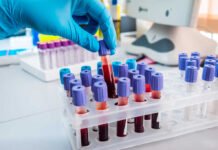
Recent studies show that a new blood test has been devised to predict the risk of pregnancy complications such as pre-eclampsia. Pre-eclampsia is a medical condition known to cause high blood pressure in pregnant women and often leads to the deaths of pregnant mothers. However, this new blood test has been predicted to notify medical professionals earlier of such conditions.
How Does This Test Work?
Experts carry out this test by thoroughly analyzing the RNA molecules that circulate in the bloodstream of expectant mothers.
Although the blood test is still being developed for commercial use, the research team behind this recent innovation analyzed cell-free RNA molecules from more than 1,800 women across a spectrum of age ranges. These women also differed in terms of ethnicities and body masses and were at various stages of pregnancy. By collecting the blood samples of these women between 16 and 27 weeks of gestation, the researchers could identify about seven genes with expression levels that differed such medical condition —i.e., pre-eclampsia— from a normal pregnancy. Out of these seven genes, four of the genes had either been associated with pre-eclampsia or placental development.
Stephen Quake, a biophysicist at Stanford University and one of the leading scientists behind this discovery, also noted that this test might detect possible signs of pre-eclampsia and give insights into whether a mother is at risk of giving birth to a premature baby.
According to Quake, the blood bears particular free-floating material that constitutes part of the genetic makeup of pregnant mothers. These cellular snippets may indicate to the scientists which genes are active and the stage of the fetus in its development. Quake further noted that blinded clinical trials —which will help to validate the test—are the next step, which he hopes may be done in about two years.
Sarah Stock, a fetal and maternal health care specialist at the University of Edinburgh, has noted that the prospects of such tests are astounding. According to her, such a test will be helpful for pregnant women who are preterm in their first pregnancy. However, even though it diagnoses all preterm labor cases, it may be a valuable start.
Finally, Stock hinted that the test does not pinpoint the exact date a preterm birth may occur –it only notifies the doctors of the potential risk of preterm birth. However, the information from such a test may help these pregnant ladies give birth easily and provide guidance on the type of care and facilities for such women.


















